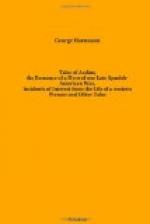“Herr von Beerstein” now places his heart and purse in the keeping of his gentle companion, who calls directly for “zwei beers.”
Now follows a repetition of the old, old legend that yet is always new and ever recurring in the romance of mutual love on sight, two hearts beating as one and in the love that laughs at locksmiths, but as the course of true love seldom runs smooth, now with the maiden’s oft repeated calls for “lager” “Herr von Beerstein” grows by stages sentimental, incautious and then so reckless that “presto!” before he is aware of any danger to himself he has stopped Cupid’s fatal dart with his royal personal circumference. Maddened with pain he exhibits symptoms of a most violent passion and becomes very aggressive. But the cunning maid appeals to the protecting presence of Fritz, the waiter, with other calls for beer, whispering in the ear of her love-lorn swain: “Nine, mine lieber Herr von Beerstein, ven you has married me once alretty, nicht wahr? Ach vas, den shall you kiss me yet some more, yaw!”
Thus she tantalizes the poor man until he becomes desperate under the strain of an unrequited love and as a last resort he places his hand over his heart, bares the bosom of his shirt and exposes the insignia of royalty, flashing the sovereign’s star before her eyes. Humbly, overcome with shame and remorse at the thought of having trifled with her king’s affections, and prompted by her pitiful exaggerated notion of loyalty the poor thing kneels before his majesty, craving his pardon.
With royal hands the king uplifts her, graciously kissing her rosebud mouth and when she says: “Your majesty’s slightest wish is a command to me, your servant!” and is about to surrender her loveliness to Cupid’s forces and temporarily lose her heart, but her soul forever—in the very nick of time comes her guardian-angel to the rescue.
When she, poor little gray dove, lies trembling in the royal falcon’s talons a head rises up and peeps over the fence, for the royal star has been seen through a crack between the boards, its knowing, sly grin passing into the lusty shout:
“Heil dem koenig, hoch, hoch!”
An excited crowd rushes from all directions, cheering: “Ein, zwei, drei, hurrah!” while a constable places the damsel under arrest, charging her with lese majeste. When, however, his majesty intercedes most graciously the your lady is promptly released, and restored to freedom.
But the constable’s fee that she must pay—in earthly power, not even a king can save her from it, for that is a “trinkgeld” and she pays it from the royal purse.
On the evening of the king’s arrival I accompanied my father to the castle where the reception royal took place. There were no ladies present on this occasion. The king was, as has been said, totally blind, but indulged in the curious habit of feigning to have an unimpaired eye sight and pretended to admire scenic objects which had been pointed out to him beforehand as though he really saw them, carrying out this illusion to the extent of ridiculousness. It is said that at a hunt-meet a courtier incurred his royal displeasure through these incautious words: “Sire, you shot this hare from a next to impossible distance, condescend to feel how fat it is!”




